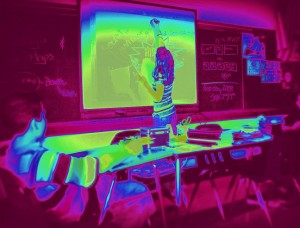Interactive WhiteBoards, like the SmartBoard, have become commonplace in many schools over the past decade. IWB’s afford access to a variety of learning styles and can support inclusion according to Universal Design for Learning theory (Pellerin, 2013). They promise the ability to increase student engagement by providing a focal point for instruction, interactivity, gaming and animations. This increased focus and engagement can improve student learning (Troft and Tirotta, 2009)
IWBs – be SMART Savvy. How are IWBs used in the classroom and to what effect? Are they simply a place to hang student work, a glorified projection screen or are they transformative tools? Visit the Sandbox to share… Link Theory to Practice by downloading the hand-outs below.
Share your thoughts, links and ideas about IWB use in the classroom.

Evaluate as your explore. Whether you create a lesson or find one on-line, be sure to participate in some formative assessment as you go (Weston, 2004). Try asking yourself critical questions as you explore:
Does the lesson or interactivity:
1. Support and/or meet the learning targets, current curriculum or the needs of the students and/or the teacher?
2. Provide a transformative experience rather than simply replacing existing technology? i.e. is there some affordance you have with this technology/interactivity/lesson that you would not otherwise have?
3. Reflect the pedagogy of the classroom teacher and/or current educational philosophy?
• Does it encourage student-centered learning or personalization? Do students USE the IWB or simply watch it?
• Does it allow for active learning? student knowledge creation? small group work? hands-on interactivity?
Resources:
SMART Exchange – http://exchange.smarttech.com/#tab=0
Scholastic – http://teacher.scholastic.com/whiteboards/learninggames.htm
ELL/Language Learners – http://iwblanguagelessons.com/
Planning for Smartboards/IWB (a White paper by SMART Technologies) – http://bit.ly/1aLny0f
Create your own games – http://www.classtools.net/_mobileQuiz/index.php


 Follow
Follow
Thank you for offering this seminar, today helped to clarify some ideas on Smart Boards. Instead of Smart Boards being an abstract concept in my head, it’s now a concrete idea and I can envision my future relationship with them.
I’d like to offer some feedback for any further seminars.
When I walked in today my knowledge of Smart Boards was very low. I knew they were an application of touch screen technology that some classrooms were now using, but I had very little understanding of what their capacity was or in which situations they’re most beneficial. I felt I could have benefited from a brief explanation/demonstration of what a Smart Board *is*, and what it can and can’t *do* before we were given free time to experiment with the design program.
In addition, I personally would have appreciated any notes on research that has demonstrated situations in which using Smart Boards had a positive effect on student learning. I don’t expect you to have *known* that I wanted to know that, but I would have appreciated a some designated time during the introduction when we might ask questions.
Again, thank you for offering these seminars and I look forward to fleshing out my understanding of the relationship between education and technology as they continue.
Hi Mark, thanks very much for your feedback and for articulating what likely more than one participant felt. I appreciate it and it does help us moving forward.
Since these ‘sandboxes’ are quite new and are open to such a wide range of people, we’re feeling it out as we go along and are definitely open to modifications. This week’s first session was unique in that normally we would have two sessions in a week to explore. In that way, we might be more able to spend a little extra time on the Wednesday session with an overview and introduction and the Friday session as more of a drop in play session… I’d love more feedback from others on this possibility.
One concern I have is that whenever exploring technologies with a wide-ranging group (as all groups are), one is always in danger of either moving too quickly for some and going over material that is known to others… the tension between this is something I struggle with in this particular venue – given size, access to tech, the ‘drop-in’ nature etc.-
We could, perhaps, look at making the Wednesday somewhat more of an intro day in order to mitigate some of this concern. Regardless, we are trying to model a more exploratory approach with respect to tech integration – I’ve found that my students tend to learn a great deal from their conversations with each other as they ‘mess about’ with tech and, over time, construct a deeper understanding through trial and error and questioning/participating in discourse as they go.
Regarding research – did you get a copy of the hand-out? There are several sources cited in the literature that are all accessible online using UBC library. I had hoped to provide a brief overview in that way rather than a lecture style overview. My hope is that this conversation could then continue ‘asynchronously’ in this blog space where people might share research, ideas, etc. That is my hope anyways…
Again, thanks and I look forward to further feedback and participation in our blog. We’ll definitely revisit IWBs in a later session – just wanted to get started with them quickly as many TC’s had expressed that they’d like to at least have an opportunity to try one out prior to hitting the schools on practicum.
btw – a reminder to all – the IWB in room 155 is yours to explore. Simply check the class schedule on the door to the room (the door from the library, not the door in the hall) to see if the room is booked for a class. If it’s not booked, please drop in and mess about.